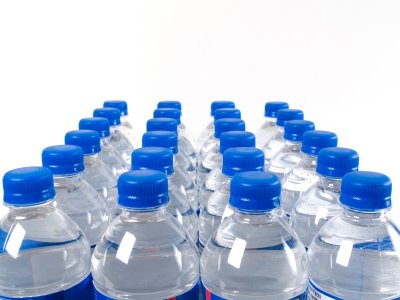Plastic water bottles are a common feature in urban life. The availability of water bottles is common and the cost is affordable by all sections of the society due to which its use and misuse has increased manifolds with time. People also provide it for free in mosques and other public locations. It is because of its easy availability that people misuse this resource considering it free, taking a bottle, sipping it, consuming partly and leaving it at the venue or throwing it in garbage bins.
Empty and partially consumed plastic water bottles are collected and thrown away in municipal garbage bins from where it is collected and transported to municipal landfill site. These water bottles have a high carbon footprint and represent enormous wastage of precious water source and misuse of our other fragile resources. In many cases, these water bottles are littered around commercial and religious places.
Startling Facts about Plastic Water Bottles
Bottled water is widely used by people from all walks of life and is considered to be convenient and safer than tap water. A person on an average drinks around 2.0 liters of water a day and may consume 4-6 plastic bottles per day.
Infact, UAE has the world’s highest per capita consumption of bottled water of as much as 285 liters per year and a typical UAE resident uses around 450 plastic water bottles each year.
We need to understand the fact that plastic is made from petroleum. 24 million gallons of oil is needed to produce a billion plastic bottles. Plastic takes around 700 years to be degraded. 90% of the cost of bottled water is due to the bottle itself. 80% of plastic bottles produced are not recycled. Globally, plastic recycling rate is very low and major quantities of plastics are being disposed in the landfills, where they stay for hundreds of years not being naturally degraded.
Recycling one ton of plastic saves 5.74 m3 of landfill space and save cost of collection and transportation. Water bottles manufacturing, transportation, distribution and again collection and disposal after its use create enormous pollution in terms of trash generation, global warming and air pollution.
The transportation of bottled water from its source to stores alone releases thousands of tons of carbon dioxide. In addition to the millions of gallons of water used in the plastic-making process, two gallons of water are wasted in the purification process for every gallon that goes into the plastic bottles.
The Way Forward
The solution to the menace of plastic water bottles lies in its minimum use and safe disposal. The first step is that once you open a water bottle, you need to completely consume it to fully utilize the resource. Do not throw away plastic bottles as litter.
Alternatively, a flask, thermos or reusable water bottle can be used which can be refilled as required. It is advisable that religious places, hotels, malls, restaurants, conference rooms etc. should have efficient water purification plants and water dispensers to reduce the use of plastic water bottles.







A very informative articles on the facts and figures of plastic bottles. Is there anyone who is actually recycling these plastic bottles?
The situation is I guess different in each country but in the UK most municipal authorities now have collection systems that target plastic bottles amongst other items such as paper and cans. The problem is though that the UK government sets recovery and recycling targets for each municipal authority to reach that are based on weight and plastic bottles have a large volume to weight ratio so UK waste collection agencies concentrated on collecting the heaviest waste fractions first – glass and paper – that also have the best resale prices and plastics are much less economically viable for waste collectors as a result. Ideally we would as a society reduce our use of plastic bottles as the article says through the use of alternatives such as reusable bottles. Or maybe we would use more easily recyclable materials such as glass where using reusable containers is difficult. Many waste agencies in the UK are looking to energy recovery as the best way of dealing with plastic wastes as intrinsically they are just oil derivatives so have a high energy value.
Perhaps we need to consider changing attitudes and behaviour by taxing products that are so environmentally damaging? For instance the UK mandated that carrier bags have to cost £0.05 each at supermarkets and it will be interesting to see what the impact of that is once the scheme has run for a while – so far it looks to have achieved a radical shift in behaviour with most customers now using reusable ‘bag for life’ options instead.
I can recycle all plastics
But the main problem is people throw them anywhere if there is no collecting device that is we’re it end up in the sea
Pingback: Eco-building a Plastic Bottle Village From Rubbish Removal | EcoMENA
Pingback: Towards a Green Hajj | EcoMENA
Pingback: Eco-Friendly Project Ideas for School Students | EcoMENA
Pingback: Common Water Pollutants and Their Effects on the Environment | EcoMENA
Pingback: Green Resolutions for the New Year | EcoMENA